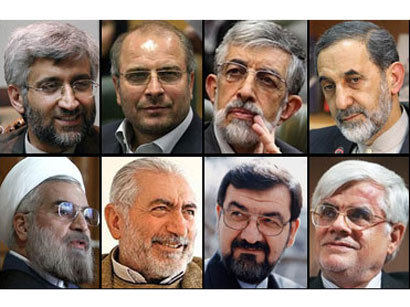Iranian presidential candidates start debates on live TV

Eight Iranian presidential candidates started debates on live television on May 31, IRIB News reported live.
Former Telecommunications Minister Mohammad Gharazi was asked about inflation and unemployment.
He said that during the last 100 years the inflation rate constantly arised, and the national currency dropped in value, adding that his plan is to strengthen the currency as it would lead to decrease of unemployment rate and economic growth.
"In 33 years since the revolution, the country has been facing increasing inflation," he said.
Lawmaker Gholam-Ali Haddad-Adel said that unemployment and job creation is more important than attempting to raise national currency value.
He noted that Iranian firms have closed or work with low capacity and the first priority should be boosting activity of firms and industry sector.
Tehran Mayor, Mohammad Baqer Ghalibaf, in turn, said that economic growth depends on creating short and long term jobs, based on economic plans.
Former Foreign Minister Ali Akbar Velayati said that economy should be based on production, not distribution, and rely on people.
Secretary of Expediency Council Mohsen Rezaei said that the plans should be arranged to create jobs for people, adding that employers should be supported as well.
Secretary of the Supreme National Security Council Saeed Jalili said that the government should pay attention to agricultural sector, housing sector, oil and gas fields and steel production sectors.
"The industry sphere should be diversified and competition among the companies should be in place," he said.
President of the Center for Strategic Research of the Expediency Council Hassan Rohani believes that the unempoyment shoud be a priority issue.
"There are about 3 million of jobless people in Iran, and 800,000 of them are educated, but still jobless. We should create job opportunities for them," he said.
Former Telecommunications Minister Mohammad Gharazi then said that nobody has put any investment into the industrial sector of Iran in the past 20 years. He noted that the high inflation rate and drop in national currency should be handled first. He also added that there is no possibility for local producers to compete with importers.
Former First Vice President Mohammad Reza Aref said that excluding reformists and other politicians from country's management has led to economic and political problems during Ahmadinejad's government ruling.
All candidates underlined the necessity of contribution to economic sphere, using the professional figures, without regarding political views.
The debates further continued.
Mohsen Rezaei criticized the housing sector, noting that the prices there are high, and increasing.
Mohammad Bagher Ghalibaf, in turn, said that the housing sector would be his first priority as president, if he wins the elections.
"With developed housing sector, construction of one new house means creating extra 250 new jobs," he said.
Mohammad Gharazi said that the government should be looking at the country's economy as one piece, not as separate sections.
"The housing sector should be developing alongside other sectors. Unemployment in the country leads to one losing his house as well," he said.
Saeed Jalili said that Iran had 850,000 marriages during the last solar year, and it is necessary to have a program and planning for the housing sector to meet the needs of the new families. He also said that the reconstruction of old buildings should be put ahead of the housing sector plans.
Former First Vice President Mohammad Reza Aref said that the number of people living in poverty has increased, and it is necessary to pay attention to small towns and villages as much as to big cities.
Speaking about corruption, Secretary of Expediency Council Mohsen Rezaei noted that corruption and bribery have increased in Iranian government structures.
Hassan Rouhani noted that 66 percent of women in Iran from age 20 to 29 are jobless. He went on to say that the focus of economy in Iran should be changed.
Iran will hold the 11th presidential elections on June 14. The voters will choose the successor of the current President Mahmoud Ahmadinejad, who is not able to participate in the elections for the third term according to the country's constitutional laws.
The president of Iran is elected for a four-year term in the national elections and the Guardian Council vets the candidates for qualifications.
Here we are to serve you with news right now. It does not cost much, but worth your attention.
Choose to support open, independent, quality journalism and subscribe on a monthly basis.
By subscribing to our online newspaper, you can have full digital access to all news, analysis, and much more.
You can also follow AzerNEWS on Twitter @AzerNewsAz or Facebook @AzerNewsNewspaper
Thank you!
